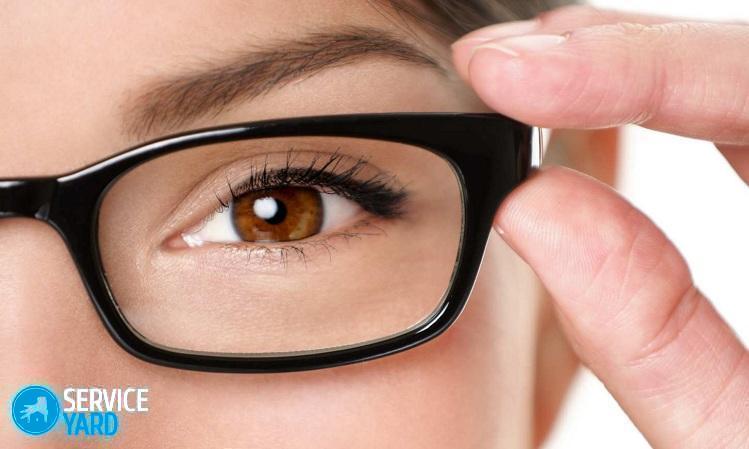Glasses for glasses - which are better?

Eyes are not only a mirror of the soul, but also a kind of filter through which a huge amount of different information passes daily. Using electronics today has become an integral part of our lives. And it is not surprising that our eyes are under enormous strain. That is why people are increasingly suffering from visual impairment and turn to specialists for help. After the ophthalmologist wrote you a prescription, a logical question arises: how to choose glasses for glasses, which are better? This matter needs to be approached very carefully, since the health and comfort of your eyes will depend on this. Most people pay attention only to the appearance of the frame, rather than to the lenses of glasses, but this is not a very correct approach. So how do you choose glasses so as not to miscalculate, because lenses for glasses have many criteria that should be followed when choosing? Now we will deal with this.
to contents ↑Lens refractive index
This is one of the most important lens parameters. The volume and thickness of the lens depend on this indicator: the greater the refraction, the smaller the width and weight of the object. Their use is indispensable with a high degree of refraction and when installed in children's rimless frames.
Important! For glasses that have more than 3 diopters, it is advisable to choose glasses with a high refractive index.
At high refractive indices, the light transmission of the lens becomes worse. This problem is solved by applying coatings that contribute to the elimination of glare and lens enlightenment.
The price of higher refractive index lenses is higher. At the same time, they have a pleasant appearance and significantly increase comfort.
to contents ↑Aspherical or spherical lens?
Glasses of standard glasses have a spherical surface. Such lenses are called spherical. Aspherical glass options - on the contrary, have a flatter appearance. Compared to spherical lenses, they have many advantages:
- The eyes in them look attractive.
- Do not distort the lateral viewing angle.
- The clarity of the image increases.
However, aspherical models clearly lose to their spherical competitors in terms of reflective properties. Which glasses for glasses is better to choose - spherical or aspherical, it is up to the buyer to decide.
to contents ↑Plastic or glass lenses?
Previously, glasses were made exclusively with glass lenses. These lenses have another name - mineral. But over time, they began to produce lenses that are made of plastic, or, as they might call it, polymer.
In the beginning, the polymer had many disadvantages compared to the mineral counterpart. But over time, manufacturers tried to improve their optical characteristics and wear resistance. And today, plastic products in their merits are no worse than glass ones, and even take some advantage.
Which lenses to choose for glasses - mineral or polymer, depends on many factors.
The advantages of glass lenses:
- Clear and clear glass, even after many years of use.
- Durability. Over time, such lenses are not deformed.
- Protect the retina from harmful ultraviolet radiation.
Important! This is ideal for people who have to spend a lot of time under the sun.Such lenses are recommended for skydivers, pilots, and drivers.
- They have excellent bandwidth, regardless of the type of lighting.
Important! At the request of the buyer can order the application on the surface of the lens anti-glare, polarization or antireflection coating.
Disadvantages of glass lenses:
- They have reduced shockproof properties, so you need to carefully and carefully treat such glasses.
- The production of double-curvature glass lenses is a serious investment that is why people with astigmatism are advised to buy polycarbonate lenses.
- May cause discomfort when worn in the form of heaviness in the nose bridge and the appearance of traces of the rim.
- Slow change in light transmission properties of photochromic lenses with different types of dark shades.
The advantages of plastic lenses:
- Impact resistance. The polymer is considered the most resistant to falls and shocks.
Important! Polycarbonate models are 200 times more durable than glass models.
- A light weight.
- Heat resistance. They withstand high temperatures, which is very important for those who work in those industries where there is high temperature.
- Comfort is provided when wearing such glasses. Due to the low weight of such lenses, you can choose both a half-rim and a rim rim.
- Security. It is much more difficult to break, but even if this happens, the fragments will be less traumatic.
- A wide opportunity for individuality. Polymer products are easier to process, which makes it possible to make such glasses in various color variations.
Important! It is worth considering that the influence of different colors distorts the perception of everything around and affects the mental state of a person. For people who want to stand out, experts advise choosing glasses with discreet shades that can delay ultraviolet and infrared radiation without distorting the surrounding colors.
- Polycarbonate products are perfect for those who lead an active lifestyle.
Disadvantages of plastic lenses
Perhaps the only significant drawback of plastic lenses is that this material is very easy to scratch. Although some manufacturers already produce special coatings that are applied to the surface of such lenses. This composition makes it possible to protect the lens from mechanical stress.
Now, having studied all the advantages and disadvantages, it will be easier for you to decide on the problem of choosing glasses - glass or plastic, which is better.
to contents ↑Types of lens coatings
The choice between plastic or glass does not always satisfy the needs of the client. In addition to different types of lenses for glasses, there are also additional coatings that can save vision and make life more comfortable:
- Hardening. It is applied to almost all lenses both from the inside and from the outside. As the name implies, this coating contributes to the protection of glasses, and also extends the period of their use.
- Enlightening. It can be applied in one or several layers. Provides the perception of the purest and brightest image by reducing light reflection.
Important! The enlightening properties of glasses will depend on the number of such layers.
- Mirrored. As a rule, this coating is applied to glass due to cosmetic reasons. It gives the glasses a more beautiful and stylish appearance. This coating can be combined with any color lens staining.
- Antireflex. Enhances image quality, allowing the eyes to receive 10% more light. At the same time, visual acuity rises and stress decreases.
Important! Anti-glare glasses are a great solution for those who drive on duty or who are in the center of camera flashes.
- Hydrophobic. This coating does not allow foreign substances to be fixed on the lenses, and also prevents fogging, for example, during a sudden movement from cold to heat.
- Multifunctional.It combines several types of coatings at once, which greatly increases the advantages of glasses.
Stock footage
The choice of glasses is a very responsible matter, since the health and comfort of your eyes will depend on this. Moreover, when choosing it is very important to understand the issue, glasses for glasses - which are better. We hope that the information provided by us will help you choose the perfect glasses for yourself and use them comfortably.






